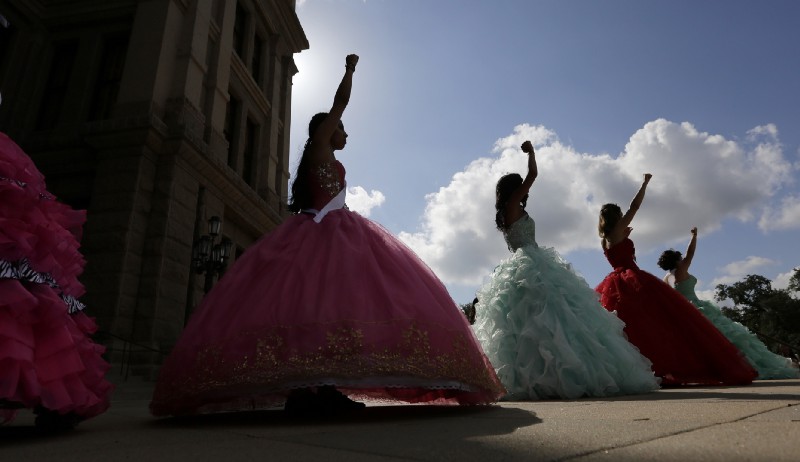A record number of openly queer and transgender Texans are seeking office across the state in 2018, part of a growing response to national and state-wide policies targeting the LGBTQ community.
According to OutSmart, a queer Houston publication, at least 35 openly LGBTQ Texas candidates are running for public office in 2018. That’s approximately twice as many as have ever run during any election cycle in Texas history. While six of the candidates are incumbents, the rest are newcomers. At least two are running for governor, with others eyeing seats at a national level in Congress. Some are vying for positions in the state Supreme Court or the Texas Legislature.
The upsurge follows a year of tension within the state over the rights of its large queer and transgender community. At the national level, President Trump’s administration has sought to roll back LGBTQ worker protections and bar transgender soldiers from the military. Those efforts have been welcomed by some state governments, including Texas.
The second-largest state in population size, Texas is consistently ranked as one of the most hostile states for LGBTQ people. Last spring, controversy over a proposed “bathroom bill” overshadowed other policy efforts in the state legislature, eventually prompting a special session over the summer. The bill would have required Texans to use the bathroom correlating to their “biological sex” and was met with heated opposition from all sides of the political spectrum. Business leaders and Texas oil executives actively lobbied against the measure, arguing that it would hurt the state’s economy. The bill ultimately failed to pass, despite the efforts of Gov. Greg Abbott and Lt. Gov. Dan Patrick, both Republicans.
Other legislation targeting the LGBTQ community in Texas also made headlines last year, including bills barring same-sex couples from adopting children and obtaining marriage licenses. Last May, advocates counted at least 24 bills in the Texas Legislature harmful to LGBTQ Texans, part of what Chuck Smith, president of Equality Texas, called “an all-out assault on LGBT people.”
That was 2017. Less than a year later, things could be set to change, with more and more queer and transgender Texans vying for an increased role in politics. Activists and advocates say that uptick is tied to the legislative battles of last year.
“I think for many, the motivation to run is in sync with the adage, ‘If you’re not at the table, you’re on the menu,’” Smith told OutSmart. “We have recently been witnessing a continuous assault on our rights and freedoms. It is only by raising our voices and securing our ‘place at the table’ that we can ensure our constitutional rights to equal protection under the law are preserved.”
Part of that energy arguably stems from the progressive organizing efforts of last summer. Legislative proposals targeting abortion, immigration, and education, along with LGBTQ rights, united activists across issues during the special session. One of those activists was Jess Herbst, mayor of New Hope, and the state’s first openly transgender elected official. At the time, Herbst told ThinkProgress that the protests and demonstrations represented a side of Texas rarely seen on national news.
“This is absolutely not an Austin vs. Texas thing,” she said, pointing to an oft-repeated argument pitting the politically progressive capital city against the larger state. “People are here from the [Rio Grande] Valley, from Houston, from El Paso, from Dallas, Fort Worth, everywhere. [The state government] represents a very small minority, and they are trying to ram their agenda down the throats of the Texas people.”
Herbst is now one of the LGBTQ candidates running for re-election in Texas and one of five transgender candidates running more generally. The candidates themselves are a diverse group constituting a number of identities — three are Black and eight are Latinx. Nineteen are women. Notably, more than a third of the candidates are from Harris County, home to Houston, the most diverse city in the United States. Annise Parker, an out lesbian, served as mayor of Houston for six years. All but four are Democrats.
One race is pitting queer candidates against each other. Democrats Jeffrey Payne, a businessman, and Dallas County Sheriff Lupe Valdez, the first openly gay and Latinx female sheriff in the country, are both running for governor in what could be a contentious race (eight Democrats have announced their candidacy so far). Payne responded positively when Valdez entered the fray, hailing the moment as an important one for the state.
“The fact that in the State of Texas, a gay man and a lesbian can seek the highest office in the state is amazing, and shows how far we have come as a society,” he said. “This is a proud moment in Texas history, as far as I see it.”
Outside of Texas, other states are taking note. Last month, Alabama Democrat Doug Jones won a shock election over Republican Roy Moore for a U.S. Senate seat, an upset Southern progressives are hoping to repeat elsewhere. Advocates for queer and transgender representation hope that LGBTQ candidates will be part of that wave — and some say the shift in Texas could be an important sign of things to come. Jasmine Beach-Ferrara, executive director for the Campaign for Southern Equality, told ThinkProgress that the state could prove a crucial model for other Southern states.
“Until the LGBTQ community can build real political power, we remain vulnerable to laws that target us and our civil rights,” Beach-Ferrara said. “Running more and more openly LGBTQ candidates for office in all 50 states is the first step in that process. We applaud all the folks stepping up to run for office across Texas: it’s inspiring to see and hopefully other states will follow this lead.”
Primary elections in Texas will take place March 6 and the general election will be held on November 6. All executive office positions, a U.S. Senate seat, and all of the state’s U.S. House seats are up for election.

